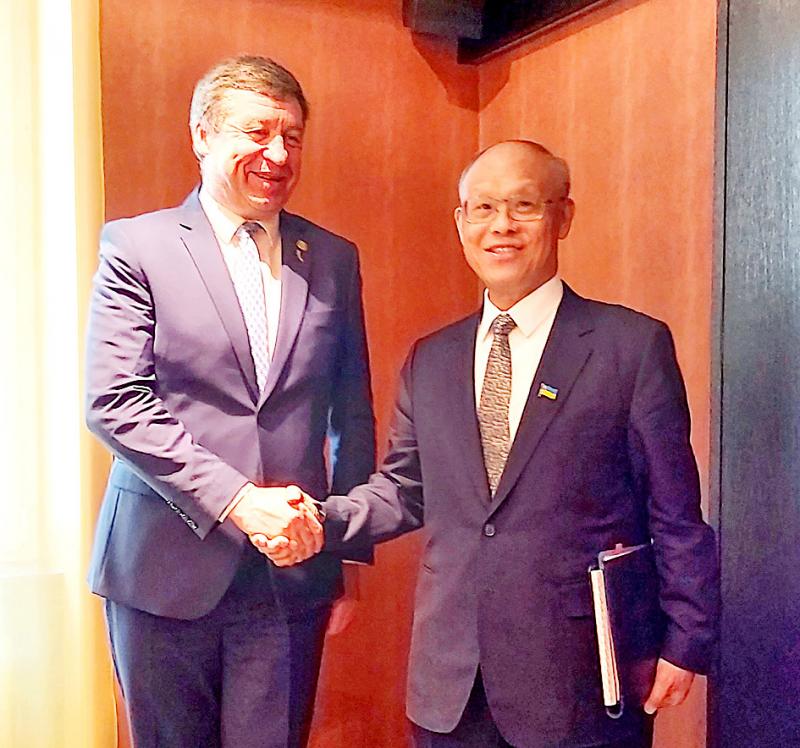Taiwan and Lithuania need to work together to resist Chinese economic coercion, officials said on the sidelines of a WTO meeting in Geneva, Switzerland, on Monday.
Minister Without Portfolio John Deng (鄧振中), Taiwan’s top trade negotiator, and Lithuanian Vice Minister of Foreign Affairs Raimundas Karoblis said that the two nations have faced retaliatory trade moves by China, while expressing confidence that bilateral trade would continue to grow.
Karoblis thanked Taiwan’s government and people for their support of Lithuania, and said he was certain that trade ties would remain strong.

Photo courtesy of the Permanent Mission of the Separate Customs Territory of Taiwan, Penghu, Kinmen and Matsu via CNA
Lithuania has a lot that it can learn from Taiwan’s semiconductor industry, which is part of the reason Lithuanian Vice Minister of the Economy and Innovation Jovita Neliupsiene is leading a delegation there, he said.
Neliupsiene arrived in Taiwan on Sunday with a group of representatives from the Baltic state’s high-tech sector.
The delegation visited the Taiwan Semiconductor Research Institute (台灣半導體研究中心) and the Industrial Technology Research Institute (工業技術研究院) yesterday and is to depart today.
Taiwan, for its part, could benefit from greater investment in Lithuania’s advanced laser and energy industries, said Karoblis, who served as Lithuania’s defense minister from 2016 to 2020.
Deng said that Taiwan and Lithuania have faced retaliatory trade moves by China in contravention of WTO regulations.
Lithuania had its exports illegally blocked by Chinese customs after Vilnius allowed Taiwan to set up a representative office there, while Taiwan has been hit by Chinese import bans on several types of fruit and grouper due to political factors, Deng said.
In response to these tactics, it is important that the two democratic countries stand together to demand that China meets its commitments under WTO trade agreements, he said.
Representative to the WTO Lo Chang-fa (羅昌發) said that the global trade groups’ guidelines make such “under the table” trade barriers difficult to regulate.
Karoblis said that the WTO should enact new rules against economic coercion to protect against unilateral moves by authoritarian countries and to safeguard the integrity of the multilateral trading system.
Ties between Taiwan and Lithuania have warmed in the past few years, with Taiwan opening the office in the Baltic state in November last year and establishing a US$100 million Central and Eastern Europe Investment Fund in January to promote business ties between the two nations.
In addition, Taiwan’s Export-Import Bank is to sign a memorandum on cooperation with Invega, a state-backed institution that offers financial services to small and medium-sized enterprises in Lithuania, which would help companies in the Baltic state import goods from Taiwan, the Ministry of Finance said in a statement on Monday.
Meanwhile, Lithuania is to open a trade representative office in Taiwan this year, the Lithuanian Ministry of Economy and Innovation said.
Bilateral trade increased by 30 percent in the first quarter this year to NT$44.87 million (US$1.51 million), data from Taiwanese customs agencies showed.

Taiwan Semiconductor Manufacturing Co (TSMC, 台積電) secured a record 70.2 percent share of the global foundry business in the second quarter, up from 67.6 percent the previous quarter, and continued widening its lead over second-placed Samsung Electronics Co, TrendForce Corp (集邦科技) said on Monday. TSMC posted US$30.24 billion in sales in the April-to-June period, up 18.5 percent from the previous quarter, driven by major smartphone customers entering their ramp-up cycle and robust demand for artificial intelligence chips, laptops and PCs, which boosted wafer shipments and average selling prices, TrendForce said in a report. Samsung’s sales also grew in the second quarter, up

On Tuesday, US President Donald Trump weighed in on a pressing national issue: The rebranding of a restaurant chain. Last week, Cracker Barrel, a Tennessee company whose nationwide locations lean heavily on a cozy, old-timey aesthetic — “rocking chairs on the porch, a warm fire in the hearth, peg games on the table” — announced it was updating its logo. Uncle Herschel, the man who once appeared next to the letters with a barrel, was gone. It sparked ire on the right, with Donald Trump Jr leading a charge against the rebranding: “WTF is wrong with Cracker Barrel?!” Later, Trump Sr weighed

LIMITED IMPACT: Investor confidence was likely sustained by its relatively small exposure to the Chinese market, as only less advanced chips are made in Nanjing Taiwan Semiconductor Manufacturing Co (TSMC, 台積電) saw its stock price close steady yesterday in a sign that the loss of the validated end user (VEU) status for its Nanjing, China, fab should have a mild impact on the world’s biggest contract chipmaker financially and technologically. Media reports about the waiver loss sent TSMC down 1.29 percent during the early trading session yesterday, but the stock soon regained strength and ended at NT$1,160, unchanged from Tuesday. Investors’ confidence in TSMC was likely built on its relatively small exposure to the Chinese market, as Chinese customers contributed about 9 percent to TSMC’s revenue last

LOOPHOLES: The move is to end a break that was aiding foreign producers without any similar benefit for US manufacturers, the US Department of Commerce said US President Donald Trump’s administration would make it harder for Samsung Electronics Co and SK Hynix Inc to ship critical equipment to their chipmaking operations in China, dealing a potential blow to the companies’ production in the world’s largest semiconductor market. The US Department of Commerce in a notice published on Friday said that it was revoking waivers for Samsung and SK Hynix to use US technologies in their Chinese operations. The companies had been operating in China under regulations that allow them to import chipmaking equipment without applying for a new license each time. The move would revise what is known